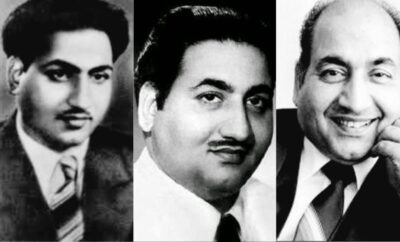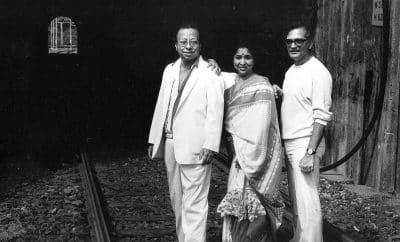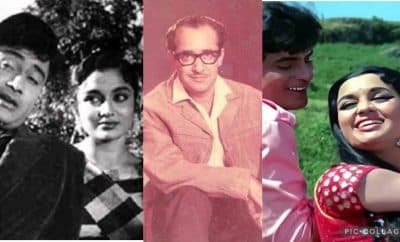Song Sketch
Bade Achhe Lagte Hain – Balika Badhu – Innocent and Pure Expression of Love
The sea and the seashores, the rivers and the riverbanks, the mountains and the dales, the dense jungles, the sunrises and the sunsets, the moon and the stars, and the blue sky and the clouds – do you like them? Of course, you do! In fact, we all do! The bounties of nature are capable of touching your inner core. But the nature seems more bountiful and touches yet deeper when you are in love, as though everything is right there, at the right time and at the right place to elicit your love. If you are a litterateur, you would be able to vividly and aesthetically describe the beautiful nature and its impact on love. Even if you are not one and are amidst the nature with your lover, it would still make you express your feelings in whatever best way you can.
The song “Bade achchhe lagte hain” from Balika Badhu (1976) is one such unsophisticated, unadorned, and candid expression of love in the midst of tranquil nature, by a callow young boy who is about to part with his love temporarily.
The film depicts the coming-of-age story of a teenage bride and her school-going husband, plotted on the landscape of the pre-independence era, based on the Bengali novel by the same name by Bimal Kar.
The adolescent couple – Amal (Sachin Pilgaonkar) and Rajni (Rajni Sharma) – is sitting on a riverbank on the eve of their brief partition, as Rajni is about to go to her mother’s house for a few days. Married at a very early age and now in their teens, they have just started seeming to each other more than just friends. Their hearts are brimming with hitherto unknown feelings for each other, and Amal is somewhat upset with the idea of parting with Rajni, albeit momentarily.
The song starts with an intense piece of violin and starts captivating us immediately. We start keenly looking forward to what is to come. Amal then sets out on the expression of his feelings through Amit Kumar’s voice, R.D. Burman’s tune and Anand Bakshi’s words –
“Bade achchhe lagte hain…”
“Kya?”, comes an innocent question by Rajni.
Amal replies, “Ye dharti, ye nadiya, ye raina…”
“Aur?” – another innocent question by Rajni expecting to hear her name in the list.
“Aur tum…” – Amal’s further reply, and we start nodding our heads with the rhythm of the song.
Amal sings the refrain again, and there comes a rousing call by a boatman in R.D. Burman’s voice as an interlude, which adds to the sullenness of the evening.
Amal continues to express himself –
“Hum tum kitne paas hain, kitne door hain chaand sitaaren,
Sach poochho to man ko jhoothe lagte hain ye saare,
Magar sachche lagte hain, ye dharti, ye nadiya, ye raina…”
“Aur?” (Rajni repeats the question.)
“Aur tum….”
As the feeling of ‘love’ has just started occupying his mind, his wife-cum-lover and the earthly surroundings seem more real to him than the distant moon and stars. He can remain grounded and look at his love from a realistic perspective, perhaps because their relationship has gradually evolved from tender age friendship to love, like a fruit that is naturally ripening on the tree.
The second interlude comes with a brief and catchy ensemble of sitar and sarangi, accompanied by swarmandal and xylophone, and Amal goes on –
“Tum in sabko chhod ke kaise kal subah jaogi?
Mere saath inhen bhi tum yaad bahut aaogi…
Magar sachche lagte hain, ye dharti, ye nadiya, ye raina…”
“Aur?” (Rajni repeats her question once more. It is a contentment of sorts for her to hear her name in his list again and again.)
“Aur tum…”
She is now as much an integral part of his life as the surroundings. He thinks that the entire milieu is in love with her alongwith him, and it would equally miss her on her departure. The entire nature around him would seem lacklustre to him without her.
And then Rajni moves closer to him resting her head on his shoulder with satisfaction.
Sachin Pilgaonkar and Rajni Sharma make an adorable teen couple and the song has magnificent panoramic views of the calmly flowing river, its sparsely green banks, the dusky sky, and the hovering white clouds.
R.D. Burman has created a magic through this composition based on raag Bihaag. The composition is relatively simple as compared to his usual style. He has underplayed by using sparse orchestration and muffled percussion to suit the demand of the situation. This shows his creativity and immense acumen in adapting to the situation of the song. Use of the boatman’s call (in his own voice) as the first interlude to intensify the partially gloomy and partially romantic situation is a brilliant idea.
When it came to deep expressions in simple words, Anand Bakshi was one of the best choices and he has done a complete justice here too. He expresses the feelings exactly as a youngster, in love yet a little naïve, would do with innocence and purity.
Amit Kumar has poured his soul in the rendition and has effectively brought out the nuances and sways in the tune. Quite young as he was then, his rendition perfectly suits the young chap. It was his first hit, after which many film song assignments started flowing to him. He therefore fondly remembers this as his ‘bread and butter’ song.
While Amit Kumar had sung only a handful of film songs before this, most of which were not even noticed by the people; and was still happy doing stage shows in Kolkata without any ambition to become a playback singer, he happened to visit R.D. Burman’s music room in Mumbai with his father. R.D. Burman asked him to sing a few lines. Amit Kumar was quite tensed to sing in front of the stalwarts like R.D. Burman, Manna Dey and his own father, and somehow managed to sing a few lines form a song from Jhumroo. Kishore Kumar later scolded him for his shyness and lack of ambition. To their surprise, however, R.D. Burman called Amit Kumar to his studio the next day and asked him to record “Bade achchhe lagte hain”. R.D. Burman told him that he wanted ‘Amit Kumar’ and not ‘Kishore Kumar’; and Amit Kumar sang in his own unique style without copying his father. And then Hindi cinema could not avoid taking a note of the new playback singer, sounding somewhat like Kishore Kumar, but with his own style and energy.
This ‘bread and butter’ song of Amit Kumar remains popular even today, with the youth from each generation being able to relate to the innocent and pure expression of love. Whenever we listen to the song, it seems as if it has ended quickly; and we wish this ride on the boat of love could last a little longer.




दिव्या शुक्ला
July 3, 2022 at 2:52 pm
बहुत सुंदर आलेख
Virender Gupta
July 3, 2025 at 1:39 pm
Very well written 👏🏼